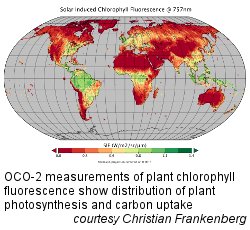Carbon Cycle And Ecosystems

The Carbon and Ecosystems group studies the role of ecosystems and the carbon cycle within the Earth System. Research in the group focuses on carbon cycle-climate interactions, impacts of climate on ecosystem structure, function, and composition, as well as on disturbance processes, such as wildfire. Members of the group study tropical drought effects, warming and changes in permafrost regions, land use change, effects of ocean climate variability on marine biology and biogeochemistry, terrestrial-marine interactions in the coastal zone, greenhouse gas emissions from cities and energy systems and the consequences of functional diversity for ecosystems on land and in the sea.
Key science questions our group is focused to addressing include:
- What is the effect of drought on the global carbon cycle?
- How do terrestrial and marine processes affect productivity in the coastal ocean?
- How does the composition of ecosystems—the abundance of different plant and phytoplankton species—affect their function?
- How do climate, vegetation type and land management affect evapotranspiration?
- How are emissions of CO2 and CH4 changing and why?
Carbon Cycle And Ecosystems: Missions and Projects
- OCO-3 - Orbiting Carbon Observatory-3
- OCO-2 - the Orbiting Carbon Observatory
- CARVE - Carbon Vulnerability in Arctic Reservoirs
- ECOSTRESS - the Ecosystem SPacebornbe Thermal Radiometer Experiment on the Space Station, scheduled for a 2017 launch.
- CORAL - COral Reef Airborne Laboratory, scheduled for 2016-17 start.
The group includes expertise in satellite and airborne instruments and observations, prognostic and assimilation modeling, in situ measurements and calibration/validation and draws on expertise in terrestrial, marine, atmospheric and urban/energy systems. The group has several foci:
- Global carbon-cycle climate system coupling, using global observations of XCO2, XCH4 and other species in conjunction with prognostic and assimilation models. This work builds on NASA programs such as OCO-2 and the Carbon Monitoring System.
- Reducing uncertainty in greenhouse gas emissions. Uncertainty in megacity and nation-scale emissions of CO2 and CH4 is high and growing, wherein novel techniques need to be developed and deployed to improve quantification and prevent uncertainty in emissions from increasing uncertainty in natural fluxes.
- Integrated studies of change in key carbon cycle regions, areas of high flux and storage, such as the High Latitudes, where high carbon storage in soils could be disrupted and ocean carbon uptake modified by changes in ocean circulation, and the Tropics, where events, such as drought and El Nino/La Nina, could modulate tropical forest and ocean carbon stocks and fluxes.
- Carbon cycle-water cycle coupling. Water exerts direct controls over carbon fluxes, for example, through soil moisture and evapotranspiration, controlling microbial respiration and photosynthesis: this science area builds on advances in remote sensing of water and carbon cycle variables.
Sensor, measurement, and technology development. The group has expertise in radiometry, fluorescence, spectroscopy, RADAR and LIDAR techniques, as well as novel in situ and airborne approaches and develops and proposes new sensors and measurements in support of the scientific community and NASA’s priorities.